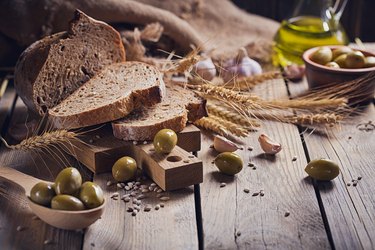
Peanut butter and jelly sandwiches, avocado toast, homemade breadcrumbs — bread is used in countless ways for different snacks and meals. But the kind of bread you choose and what you decide to put on it may affect your cholesterol levels.
Choose Whole-Grain Options
Video of the Day
When you go to the store, you have a choice of many kinds of bread. White bread is made with refined grains, which fewer nutrients because they're removed during the refining process, according to the Harvard T.H. Chan School of Public Health.
Video of the Day
Choosing a whole-grain or whole-wheat option will provide you with each part of the grain — the bran, germ and endosperm. Each of these parts offers several health-promoting nutrients such as fiber, B vitamins, antioxidants and phytochemicals.
The USDA's 2020-2025 Dietary Guidelines recommend 6 ounces of grain-based foods daily. Half or more of those should be 100 percent whole grains, such as barley, brown rice, buckwheat and oatmeal.
To ensure you're choosing foods that are whole grain, check the label. Here's what to look for:
- Any whole grain as the first ingredient.
- Added sugars not being among the first three ingredients listed.
- "Whole" being used to describe any grain ingredients.
- An industry-sponsored Whole Grain Stamp.
Prefer the taste of white bread? The Mayo Clinic suggests white whole-wheat bread as a good option. It's made with whole grains and comes with the same nutritional benefits.
Whole Grains and Cholesterol
Several studies have underscored the benefits that whole-grain foods have on cholesterol levels. A September 2015 review in the American Journal of Clinical Nutrition showed eating whole-grain foods lowered LDL (the "bad" cholesterol) better than non-whole-grain diets. Another find: Whole-grain oats were the most effective grain for reducing cholesterol levels.
With whole-grain foods comes fiber, another nutrient that has been found to reduce LDL cholesterol. "More fiber consumption can lower your 'bad' LDL cholesterol levels," says Jillian Klein, RD, a clinical dietitian at Mercy Health in Michigan. "While traveling through your intestine, soluble fiber will bind to cholesterol to prevent it from being absorbed into the bloodstream. Foods high in soluble fiber include oat bran, beans, fruits and vegetables."
A May 2017 meta-analysis in the American Journal of Clinical Nutrition found 3 grams of viscous soluble fiber a day reduced LDL cholesterol levels by 10 percent, which in turn is associated with a lower risk of heart disease.
The Academy of Nutrition and Dietetics suggests increasing your fiber intake gradually and making sure you stay well hydrated. Doing so will reduce the risk for constipation.
Be Mindful of Fat
It's not just about the bread you choose, but also about what you eat on it or with it. When preparing toast, people usually spread butter on top, but that tends to contain high amounts of saturated fat.
According to the Academy of Nutrition and Dietetics, a higher intake of saturated fats has been found to increase LDL cholesterol levels. The academy suggests reducing intake of saturated fat by:
- Cooking with vegetable oils, such as olive, canola, sunflower and safflower.
- Eating foods high in omega-3 fatty acids, such as salmon, walnuts and ground flaxseed.
- Choosing low-fat or fat-free dairy products.
- Swapping butter and lard for vegetable oil options.
- Avoiding trans fats, usually listed as hydrogenated oil on food labels.
The Academy also suggests choosing leaner protein to reduce fat intake. Limit meats with lots of marbling, as well as organ meats and foods that have been deep-fried. Choose meats that have the words "loin" or "round" on the package and remove skin from poultry. You can also reduce fat by choosing healthier cooking options, such as baking, broiling or grilling.
- Harvard T.H. Chan School of Public Health: “Whole Grains”
- USDA: “Dietary Guidelines for Americans 2020-2025”
- Mayo Clinic: “Whole Grains: Hearty Options for a Healthy Diet”
- American Journal of Clinical Nutrition: “Whole-grain and Blood Lipid Changes in Apparently Healthy Adults: A Systematic Review and Meta-analysis of Randomized Controlled Studies”
- American Journal of Clinical Nutrition: “A Systematic Review and Meta-analysis of Randomized Controlled Trials of the Effect of Konjac Glucomannan, a Viscous Soluble Fiber, on LDL Cholesterol and the New Lipid Targets Non-HDL Cholesterol and Apolipoprotein B”
- Academy of Nutrition and Dietetics: “What Is Cholesterol?”
Is this an emergency? If you are experiencing serious medical symptoms, please see the National Library of Medicine’s list of signs you need emergency medical attention or call 911.